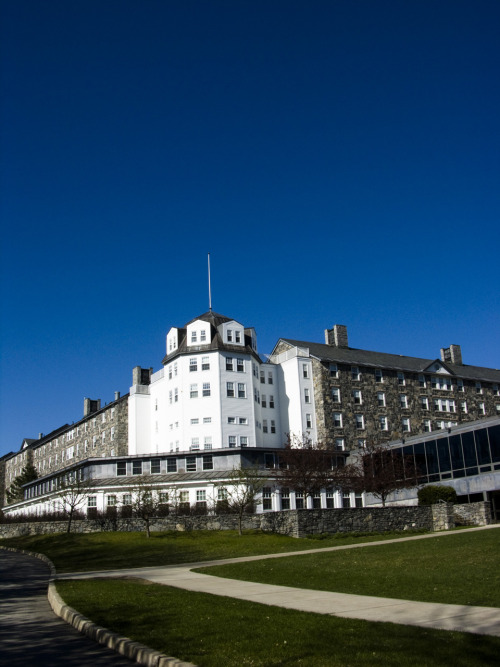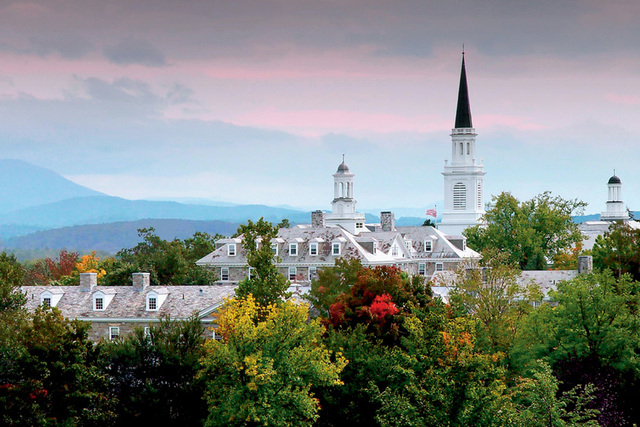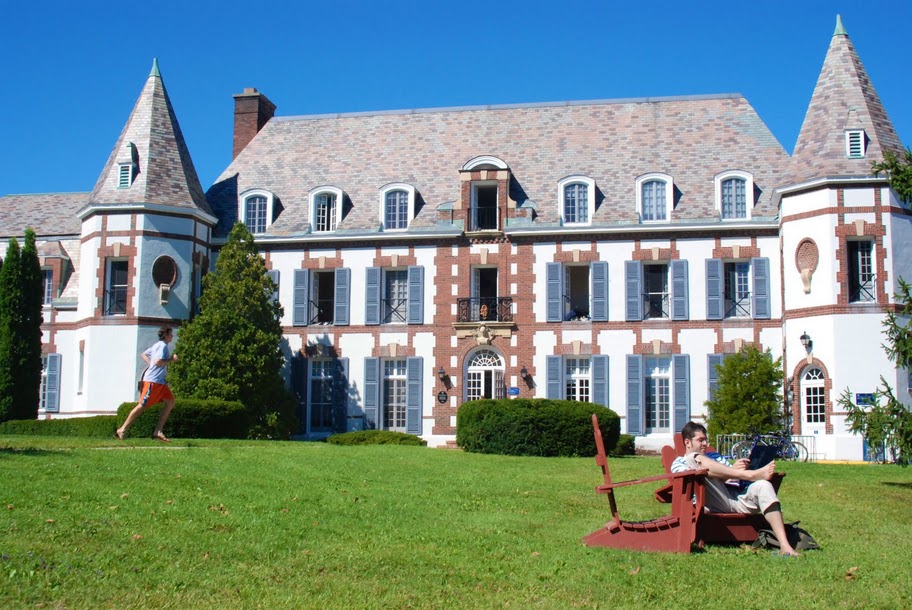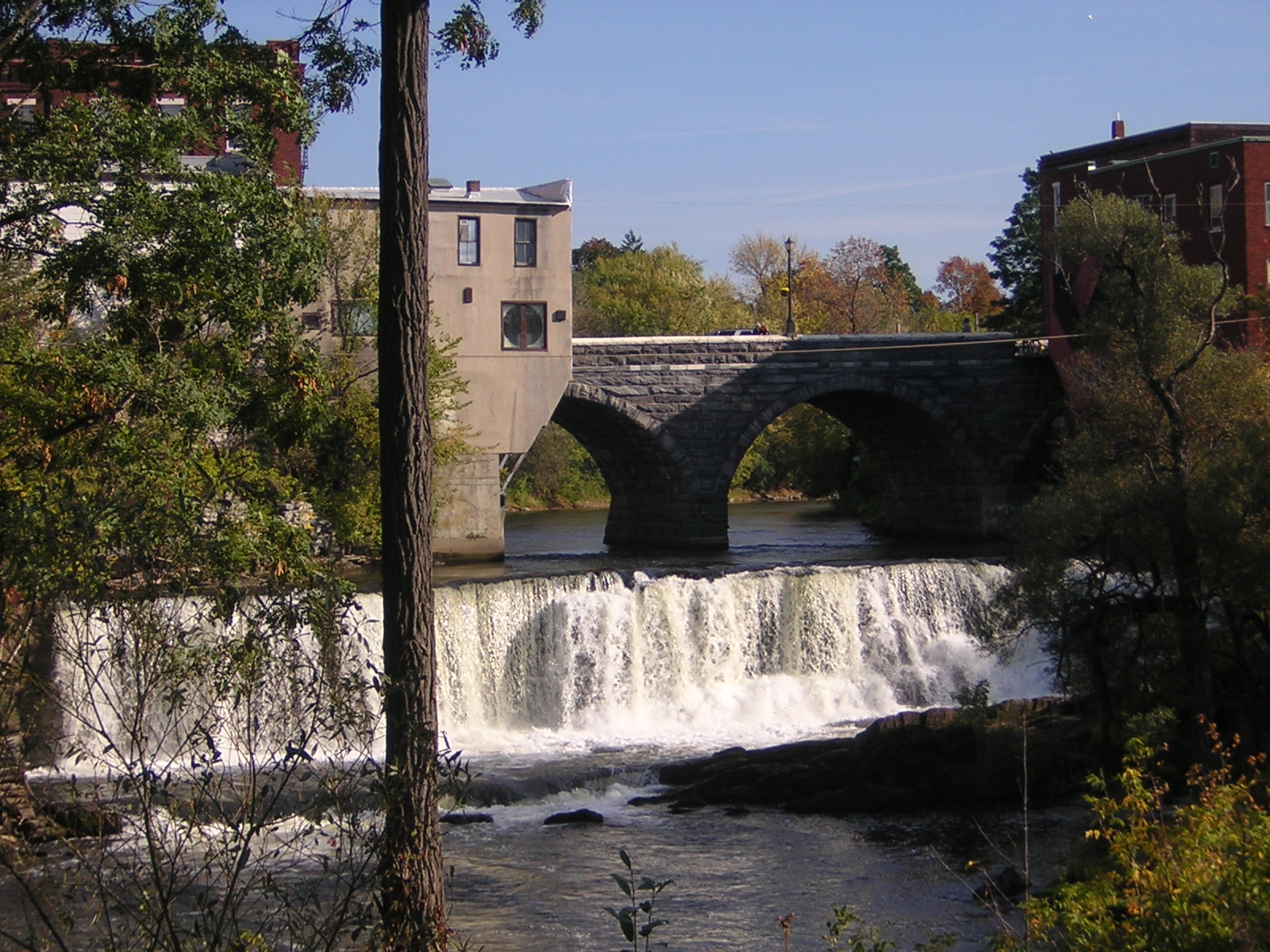According to my usually reliable memory, nobody reading this (assuming my audience here is what I think it is) has been to Middlebury. This being the case, I'd like to devote a few words to a description of the campus.
Middlebury is rather hilly. There are few places to which you can walk and not undergo a noticeable elevation change. This creates an interesting dynamic for many of the buildings on campus. Very often, if you walk into a building on the ground floor and you cross to the other side of the building, you will find that you are no longer on the ground floor. For instance, if I want to exit my dormitory building from the west, I can walk directly out without using the stairs, but if I want to use the eastern exit, I must first ascend a flight of stairs. The larger the building, the bigger the elevation change tends to be from one end to the other.
I'm not particularly sure why I just shared that information with you. It seems terribly boring and it does very little to enhance your understanding of the piecemeal story that we are all helping to tell.
 |
| A part of Ross. |
I would, however, like to introduce you to one building in particular. It's called Ross, and it's not very small. I believe I once heard that it used to be several separate buildings that decades of construction and upgrading gradually transformed into one huge structure; this is a history that I am inclined to believe because it seems to be an amalgam of different floor plans mashed together. Regardless, it is the only
building on campus that houses dormitories, classrooms, and a dining hall. Trying to find
 |
| Another part of Ross. |
your way around Ross without the experience that can only be a product of living in the building (which I do not have, seeing as I live in a different residence hall) for a sizable chunk of time would be comparable to trying to escape the Minoan labyrinth without Theseus' spool. Literally a maze of hallways, Ross will have you turning every which way, climbing and descending staircases, making wrong turns in the corridors, and finding little study alcoves that make you think, "Wow, I would love to come back here and do my homework one of these days. Too bad I'll never be able to find it again." The size and complexity of the entire complex is on a scale that I've simply never seen before. In fact, there are people on campus (and this is a verified fact, not an urban (well, rural) legend) who have successfully completed the
 |
| Yes, that is all one building. And no, you can't see the other half of it. |
"Ross Challenge"; that is, they have spent the entire winter term inside Ross. Without leaving the building. Ever. And with the weather being what it is in January, and the building being what it is, I suppose this should come as no surprise. To be honest, I think it would be very possible to complete the Ross Challenge without being consciously aware that you're doing it.
 |
| Bi Hall: lots of study space. |
 |
| Observatory on top, like a cherry. A chrome cherry. | |
 |
The strength of the hills is His also.
 |
| I live in Stewart Hall, behind the furthest building on the right. |
|
While I'm on the subject of campus layout, I suppose I'll familiarize you with a little more of it. The pictures on the left and right of these words are of the science building on campus, McCardell Bicentennial Hall, commonly referred to as Bi Hall. Bi Hall might be my favorite building here. It honestly has more hidden study rooms than there are grains of sand in all the beaches of the world. I'm not exaggerating all, either.
On the other side of campus, we have the Mahaney Art Center, otherwise known as the building with the weird teepee thingies that you can walk through in front of it.
 |
| Ah, art. |
 |
| Parlez-vous français? |
Somewhere in the middle of campus is Mead Chapel, where important things like convocation happen. There are actually a couple of chapels on campus and a few more in the tiny town nearby. Perhaps the moral of the story is something along the lines of, The prettier the church, the less religious the town. But I suppose I've never been to a southern church, so I can't vouch for their ugliness.
And then, of course, there is the Chateau, home to the French department and several dormitories. Yeah, that's right. The Chateau. We have a chateau on campus. I actually know I guy who's dorm is at the top of one of the towers. In the immortal words of Borat, King of the Castle.
 |
| We'll cross that bridge when we get there. |
And here's a couple of pictures of the town of Middlebury for good measure.
 |
| "They that dwell up in the steeple" -Poe, "The Bells" (great poem) |
|
Well, that is Middlebury in brief. I'll let you know a little bit about my classes, I suppose.
Every freshman here has to take a writing seminar, which is basically a class focused on improving writing but with a specific theme. The college offered a great variety of different seminar courses, ranging from "Discovering Infinity" to "Jane Austen and Film." My seminar is "Ancient Alexandria, Cradle of Modern Religion." Really just a writing class in which we write about ancient Alexandria, the cradle of modern religion. The professor's name is Larry Yarbrough, and I estimate his age to be about sixty. He hails from Tuscaloosa, Alabama (Everyone tells me that my favorite childhood past time of staring at maps for hours on end was a colossal waste of time. But every time I've ever met anybody from anywhere ever, I know exactly where in the world they live, and usually what the major highways are in their city, and the approximate population of their hometown, etc. I like to think I didn't waste my entire childhood.) and therefore bears a tremendous grandfatherly southern gentleman accent that is exceedingly easy on the ears. He reminds me of my dad's dad, which is about as much a compliment as I am capable of giving. I enjoy his class quite a bit; I seem to be learning more in each hour of theses college classes than I would in any given month of high school.
 |
| The Only One He Ever Feared. |
Last week, if memory doesn't fail me, I introduced you to Frank Winkler, the astronomy professor. I believe I compared him to one Albus Dumbledore. After an entire week with him, I can honestly say that this analogy holds up quite nicely. Professor Winkler, you see (literally, if you look left), is exceedingly old and, I am now convinced, a little bit mad, just like Dumbledore. His sense of humor also reminds me of Dumbledore's. Very subtle, and coming at the most unexpected times, especially during the middle of a lecture. And now that I've broached the topic of his lecture, I may as well inform you that his class is easily the most fascinating I've ever sat through. Thus far he's discussed the history of astronomy, starting with the ancient Egyptians, working up through the Mayans and into the golden age of classical Greece through Hellenistic Alexandria . . . and then we skip twelve hundred years of history that belong to the church, and just today we talked about Copernicus. I believe Galileo is the subject of Wednesday's lecture.
My history class, shocking as it may be, also makes me quite happy to be here. The title of the class is "The Making of Europe" and it is more or less a survey of European history from the Edict of Milan to the Peace of Westphalia. And yes, that is precisely the period of time that Professor Winkler skipped, the era that forgot science and therefore science forgets. The Dark Ages. Medieval Europe. Byzantine and Holy Roman Empires. That kind of stuff. The professor's name is Louisa Burnham, and she is really into history. I mean, it's almost scary how much she enjoys it. Which is, of course, a good thing, seeing her enthusiasm ensures that the class is never dull.
 |
| Arms and a man he sang. |
And that leaves one more class: Greek and Roman Epic Poetry.
In translation. Ah, yes. All the great things about Latin; the stories, the traditions, the history, the beauty of Homer and Vergil; without the bad part about Latin; the actual Latin. The syllabus of the class is very simple. We read, discuss, and write about the three greatest classics:
The Iliad,
The Odyssey, and
The Aeneid. Naturally, I find it fascinating. The professor, Marc Witkin, is a lot more normal than most professors, or at least how I imagine them. Which is a little bit weird, considering I'm used to Mr. Coe talking about the subject at hand. And I do miss Mr. Coe. But Witkin is very good at what he does, namely making us think about what we're reading.
On a completely unrelated note, I have all of your locations on my iPhone weather app. You cause me occasional envy. Let's leave it at that. And good luck with the thunderstorms this week, Rachael.
I suppose I ought to mention that on Saturday Middlebury hosted the only home meet of our cross country season. I ran really badly. Almost exactly twenty seconds
per mile slower than last week. Yeah, I'm done talking about that for now.
 |
| Chocolate? |
 |
| I remember when they first invented chocolate. |
Chocolate. I have to say something about the chocolate here. I'm pretty sure I've had chocolate, in one form or another, every single day since my arrival a few weeks ago. Chocolate muffins, chocolate brownies, chocolate pancakes, chocolate milk, hot chocolate, chocolate ice cream, chocolate chip cookies, chocolate fudge syrup, chocolate bars, chocolate rain, et cetera, et cetera, et cetera. I'm honestly going to be the first person in history to put seventy miles in a week and
still gain weight.
As you all know, I like maps. And apparently I don't like transition words. But back to what I was saying, I like maps. I'm sure it will surprise none of you to learn that I've studied the campus maps of all of your institutions. In light of this, I hope it is not too much for me to ask the names of the buildings in which you are all housed so I can get a better feel for where you live, except for Jason because I know where you live. How else could I have snuck in last night?













(A) Thanks for the luck. They just started this morning. I also felt a little tremor but no one else has said anything about it yet and I for one was not going to support evacuating into the rain
ReplyDelete(B) I live in Letts Hall, which is attached to Anderson and Centennial. We have a coffee house and a gym and lounges but no classrooms, so I don't think I'd be allowed to spend winter term in my dorm.
(C) Middlebury is much prettier than American. There are a lot of pretty spots in American, but most of our buildings are ugly. I don't mind, because my school is brand new and is amazing. It is also LEED Gold standard blah blah and was made in part out of parking meters.
(D) Now that you know where I live, you simply must visit. Soon. All us East Coast-ers should visit each other on spring break. Or visit some central location together.
(E) Your prof is amazing. I'm so jealous.
(A) When you talked about Ross (getting lost in it and finding rooms you wish to spend time in but will never find again) I was instantly reminded of Hogwarts. Of course.
ReplyDelete(B) I live in Rand. Built in 1905. My room is 311. It is quite large, with two big windows overlooking the stone chapel. Alas, it is one of the longest walks from Commons.
(C)I am quite envious of your consumption rate of chocolate, as well as the variety of said chocolate. I've refrained from eating too much dessert, as I do not run. Ever. Not even when being chased. I have a rape whistle for those things.
(D) Your campus looks amazing. I especially love the Chateau. I want to visit you. A lot.
I live in Woodbridge (104...I think...the last triple on the first floor). Cross canyon. Real purty, etc. This post has inspired me to take all of you on a picture tour of my campus. On Thursday, of course. Also, Derek, I miss you.
ReplyDeleteThank you all. Now I can break into any of your dorms. Muahahahaha!
ReplyDelete